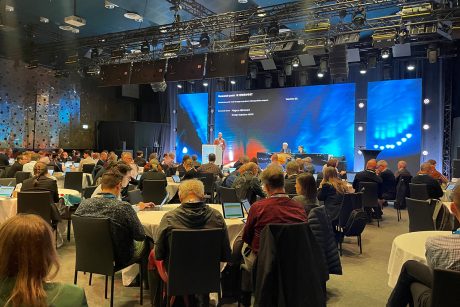May: News from Ingenjören in English

Photo: Getty images
Scroll down or click on the list to go straight to the part you want to read:
- Unemployment among engineers is increasing
- 12 pieces of advice: How to include colleagues with autism and ADHD
- This is how much engineers who are managers earn
- Sweco engineer on being given notice of strike: “I had never thought about it before”
- Are you lacking training in AI? Then you are not alone
- 9 quick steps for salary negotiations
Unemployment among engineers is increasing – but almost everyone finds a new job quickly
During the autumn of 2024, unemployment among members of Engineers of Sweden fell slightly, from 1.33 to 1.24 percent. But since then it has increased again. In April, unemployment was 1.35 percent.
A weak economy, with concerns about world trade, is part of the explanation. At times like this it is natural that unemployment figures are increasing, according to Johan Kreicbergs, Head of Social Policy at Engineers of Sweden.
– At the same time, we have seen that most of our members find jobs quite quickly at layoffs. There are few long-term unemployed, he says.
The group of engineers that stands out are engineers with a bachelor in construction. Here, unemployment has been higher for a long time. But there has been a clear improvement: from 2.7 percent in August, 2.2 in December and 2.1 percent in April.
In several other specialties the unemployment figures are rising. For example, Masters of Science in Engineering in both computer technology and electronics have gone from very low unemployment figures to being on average. But according to Johan Kreicbergs you have to be careful interpreting the changes when it comes to specialization.
– It stands out for a couple of months and then changes again, Johan Kreicbergs says.
However, Johan Kreicbergs would like to know more about how security checks and citizenship requirements have affected the opportunities for engineers with a foreign background. Several of the areas that are doing well now – for example the defense industry and the energy sector – have raised their security requirements.
World trade is also a big question mark.
– Many members work for international companies and there are no good forecasts for what will happen. It is quite a big cause for concern. There is hardly anything we produce that is only for the Swedish market or only has Swedish input goods.
Overall, he doesn’t think engineers need to be particularly worried about not getting a job. Engineers have a central role in the areas that are hot right now: Digitalization, climate change and now also resilience, such as defense and IT security.
Read the entire article in Swedish and see the statistics Ingenjörers arbetslöshet ökar – men de flesta får jobb snabbt
12 pieces of advice: How to include colleagues with autism and ADHD

About 15 percent of the population is neurodivergent, which means that they have a brain profile that differs from the norm. This could be autism, ADHD or dyslexia. This means that most of us have neurodivergent managers and colleagues, who either haven’t shared it openly or don’t realize that they are neurodivergent themselves.
Therése Utsi at the consulting firm Unicus wants to spread knowledge about neurodivergence to employers. She explains that these variations are powerful assets, but that it requires knowledge and understanding to be able to take advantage of the potential.
These are her 12 best pieces of advice:
- Increase your knowledge and work systematically over time. Learn about different ways of thinking and functioning. See the work with neuroinclusion as a protective work – secure it over time and create a systematic approach.
- Show that you are open to differences. Communicate that you are open to differences and that you are non-judgmental. This will make it easier to talk about what the employee needs in terms of adaptations, to be clear about expectations and to follow up on how things are going until you find adaptations that work.
- Don’t diagnose. It is human to draw conclusions about other people’s behavior, but instead of making hobby diagnoses, ask questions and do it with consideration. How do you function in situation x, y, z? What do you need to thrive and perform at your best? Talk about behaviors and needs.
- Don’t say “You can’t have a diagnosis!”. It is often said with the greatest of intentions, “You can’t possibly have ADHD, you’re so structured!” when a colleague shares their diagnosis. But many with ADHD and autism have learned to mask their challenges, which takes a lot of energy. Show empathy and support instead. See it as a huge trust if someone chooses to tell.
- Use your knowledge and interpret kindly. For a person with autism, it can be difficult to read between the lines and define a task. Therefore, try to understand how the person thinks. Why do they write very long and detailed emails? What was I asking for? What did I take for granted?
- Dare to be clear. Clarity is being polite and giving everyone better opportunities to do the job. Try to communicate clearly and without vague descriptions. This applies regardless of whether you are a manager or a coworker.
- Problem-solve together. If your colleague thinks you were unclear even though you tried to be clear, ask: What points were most unclear? Have you received any instructions that you thought were clear? Can you show me what they looked like? Try to problem-solve together instead of coming up with ready-made solutions. Talk about what gives and takes energy.
- Lay out the foundation for a new project. Make sure that the boundaries are clear. What is the task? Why is it required? How should it be delivered, in what format and when? 2 pages or 200? How much time am I expected to spend? What quality is expected? Who should I ask for help if I get stuck?
- Don’t assume everyone likes the same things. Afterwork at the bowling alley? Great fun for many – but not for everyone. Same thing with eating lunch at a loud restaurant. For a person on the autism spectrum, sensory impressions can feel overwhelming. Make it optional to participate. Have a quiet zone in the lunchroom and don’t question a “no thanks” to the AW.
- Set the rules for the video meeting. Having the camera on and relating to facial expressions can be exhausting. Set the boundaries in the invitation: “In this meeting we have the camera on when we introduce ourselves, after five minutes you can turn it off”. Say that it’s okay to move around during the meeting. Then you don’t have to appear rude and you can focus on the right things.
- Change can be hard. Change can be extra stressful. Be clear. Communicate what you know and can share. Say if you can’t share more right now. Be open to questions and consider different needs. Make reasonable accommodations.
- Communicate clearly. Are you going to convey a lot of information? Use bullet points and subheadings. Offer alternative ways to get information, such as an oral briefing for the person with dyslexia. State whether a meeting is mandatory or optional. And don’t forget to tell them what “happens later.”
Here is the entire article in Swedish 12 tips: Så inkluderar du kollegor med autism och adhd
This is how much engineers who are managers earn
In 2024, the average salary for engineers who are managers was 85,000 SEK per month, according to a search in the Saco Lönesök database. The numbers are based on the latest salary statistics from Engineers of Sweden.
Managers in the private sector have the best salary. The average salary per month was 86,800 SEK in the private sector. In the state sector, the corresponding salary was 71,800 SEK and 68,500 SEK for managers in the municipalities.
The higher the management level, the higher the salary. According to the statistics, senior engineering managers earned an average of 121,900 SEK. Middle managers had a salary of 89,600 SEK and first-line managers 71,500 SEK per month.
Generally, salaries increase in line with the number of subordinate employees.
Saco Lönesök also shows that engineering managers earn more than managers in many other Saco unions. While the average salary for engineering managers is 85,000 SEK per month, the average salary for managers within Saco as a whole is 77,600 SEK per month.
However, salary statistics for managers should be interpreted with caution. The finer the breakdowns, the smaller the sample. Managerial positions can also look very different depending on the industry and workplace. This makes it hard to compare different managerial positions than many other professional roles.
If you are a manager and a member of Engineers of Sweden, you can search the Saco Salary Search database yourself. However, if you want to use the statistics in your own salary negotiations it is important to remember that the figures refer to 2024 salary levels. If you are negotiating a salary for 2025, remember to calculate the salary to this year’s level.
- Here is Saco Lönesök (you need to be logged in)
- Read more about how to search the database
Here is the entire article in Swedish Så mycket tjänar ingenjörschefer
Sweco engineer on being given notice of strike: “I had never thought about it before”

What is it like to find out that your own workplace might be going on strike? Engineer Carolina Theolin knows. She is the chairman of the local union for academics at the engineering consultancy Sweco in Stockholm.
On April 9, the trade unions Engineers of Sweden and Unionen issued a notice of strike for seven workplaces, of which Sweco in Stockholm was one. Negotiations with the employer organisations Innovationsföretagen and Utbildningsföretagen within Almega had stalled. If an agreement was not reached within two weeks, the union members at these workplaces would go on strike.
– This was completely new. I had never thought about being called out on strike before, says Carolina Theolin.
She realised that a large part of the employees at the office are union members and that a strike would have a big impact on the company and its customers. At the same time, she thought that if Engineers of Sweden thought that a strike was necessary, it was the right thing to do. And she did not hear anyone saying that it was really bad.
– We are engineers. We are logical, practically minded academics.
The members had many questions, which both Carolina Theolin and Engineers of Sweden answered. There was also a member meeting to inform everyone. One important fact they talked about is that those who are called out on strike receive compensation from the union for all wages they lose. Those who are not members of the union continue to work if there is a strike – but they are not allowed to do the duties of their striking colleagues.
Many at Sweco in Stockholm who were not members of the union decided to become members during the notice period. There were also people who had been registered at the wrong workplace who now corrected it in the membership register for Engineers of Sweden.
It took eight days before it became clear that an agreement had been reached and that there would be no strike.
– It was an incredible relief when it was finished, says Carolina Theolin.
Among other things, they got one extra day off per year in the agreement with Innovationsföretagen och Utbildningsföretagen. Carolina Theolin thinks that this is a step in the right direction. She also thinks that all parties acted well, both the Engineers of Sweden, Sweco and the employees.
– I feel more than ever how important it is to belong to a union and that there are collective agreements that take care of us and ensure that we get fair conditions.
Here is the entire article in Swedish Sweco-ingenjör om att bli varslad om strejk: ”Hade aldrig tänkt tanken”
Are you lacking training in AI? Then you are not alone

A report from Engineers of Sweden shows that AI has made a breakthrough in engineers’ workplaces:
- Half of engineers use AI tools in their work to some extent.
- For 40 percent, AI is included in the products or services that their employer develops and sells.
But there is a large gap between engineers’ needs and access to training. Most engineers lack training in AI:
- Seven out of ten have not received any training to learn how to use AI.
- Four out of five want to take AI training, just over half would prefer to take training internally at the workplace and just over a fifth would like to do it at a university or a university of applied sciences.
- Nearly eight out of ten have not been offered AI training at work.
Ulrika Lindstrand, chair of Engineers of Sweden, believes that the financing model for higher education institutions does not favor investments in education for professionals. She therefore believes that universities would need earmarked money for further education.
But employers also have a responsibility to offer employees the opportunity to develop their skills during working hours. Engineers often have to find out for themselves what training courses are available, which can be difficult.
Ulrika Lindstrand has three pieces of advice for engineers who want to have more AI skills:
– First and foremost, you should discuss skills development with your manager. You cannot demand paid training in an area that is not part of the company’s business. But AI is a tool that can make many tasks more efficient.
– You also need to find out what the company’s goals are in a few years’ time. How can AI change work and in which areas can AI become very important? This can give you important information to invest in courses that you and the company can benefit from.
– There are also other ways to learn AI than courses. In the work group, you can learn from each other, find a model for knowledge transfer. Here, a great responsibility also rests with the managers to ensure that everyone in the group has the best skills, she says.
Some tips on educators who provide AI courses for engineers:
Here is the entire article in Swedish Saknar du utbildning i AI? Då är du inte ensam
9 quick steps for salary negotiations
In two articles in Dagens Industri, Camilla Frankelius, head of negotiations at Engineers of Sweden, gives her best tips before, and during the salary negotiation.

Here is a summary of what you need to think about.
1. Map yourself out. Look at what you have achieved in the last year and refer back to the performance review or the last salary negotiation. Give your boss the arguments for why you should get a higher salary.
2. What applies to you? Find out what salary criteria you have. Build your dialogue with your boss based on the salary criteria. Also, keep an eye on how the company is doing – if things are going well, there should also be room for an extra salary increase.
3. Practice so that you get comfortable talking about yourself. If there is a template for your salary negotiations, use it.
4. Put in the time. Even though these tips are quick, it doesn’t mean that salary negotiations are something you should take too lightly. Spend time gathering facts, arguments, and practicing. If your boss suddenly asks if you can take the meeting right away, ask to come back in a day or two so you have time to prepare properly.
5. Make sure it’s about you. Managers can sometimes find it uncomfortable to talk about salary. Especially if things haven’t gone so well. If your boss talks about every thing else but you and your salary, bring the conversation back to the subject. And make sure you’re actually talking about money. How much should you get? And ask for feedback – you have the right to know what your boss thinks of your work performance.
And remember: Keep your colleagues’ salaries out of the discussion. Instead, talk about the market situation and salary statistics, and what you should get in that perspective.
6. Talk about work performance – not mortgages. Talk about what you have achieved, not that you need a high salary because you have large expenses.
7. Ask for time to think – but be realistic. If you are not offered the salary you had in mind, ask for the reasons why. Make an action plan for what you need to do to increase your salary.
Another way is to ask for a few days of time to think and then have a new meeting. Perhaps the manager has reevaluated his/her position based on your arguments. But also, be realistic. Do not build up your expectations that are not based on facts and circumstances.
8. Is there no room for a higher salary? Then the employer may be able to offer something else instead. It could be a bus pass, extra health allowance, training during working hours, extra pension payments, special training, working remotely or counting travel time as working hours.
If you are offered bonuses or options – make sure that the goals are realistic and that you are not tied to the workplace for a long time to come. There may also be questions about taxes and fees that you need to consider.
Keep in mind that benefits such as car benefits, cleaning assistance and exchanging vacation pay for time off can reduce your pension.
9. Don’t threaten to quit – if you don’t mean it. Don’t say that you’ve received other job offers or that you’re quitting, if you don’t. Your boss might call your cards! But consider the possibility of changing jobs if you’re not getting the salary you deserve.
Here is the entire article in Swedish 9 snabba tips inför löneförhandlingen
More to read in English
All articles in Ingenjören that have been translated into English
The guide from Ingenjören in English
Information in English from Engineers of Sweden (including button for Google Translate-version of the entire Engineers of Sweden website)











